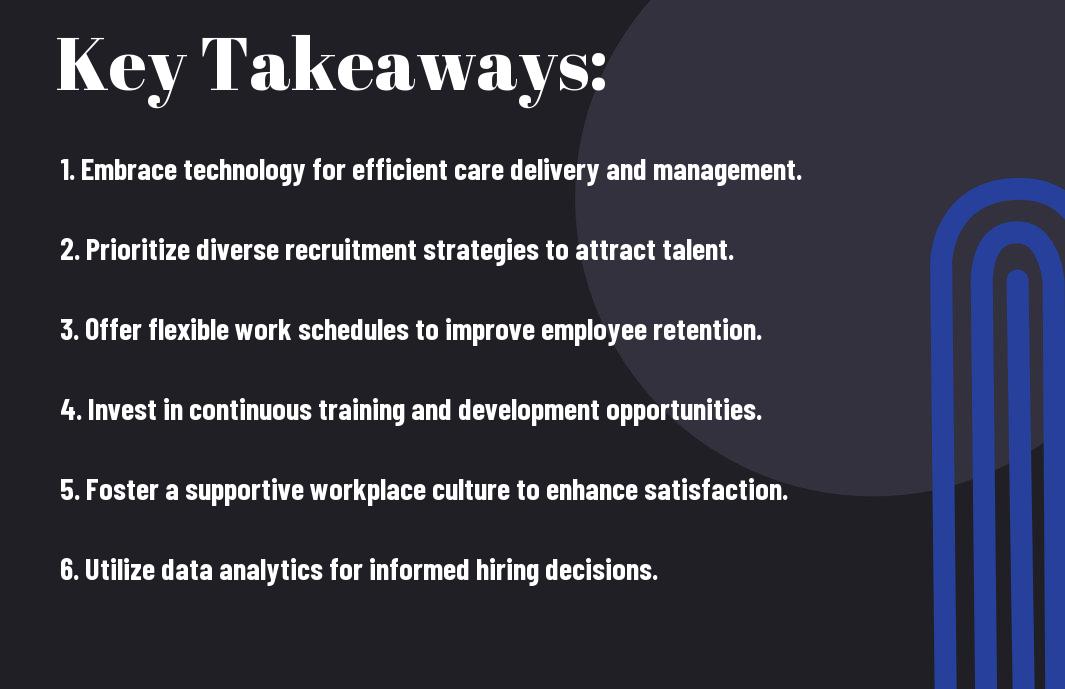Over the next decade, senior care is poised for significant transformation, influenced by evolving workforce trends and innovative talent acquisition strategies. As you navigate this dynamic landscape, it’s important to understand how demographic shifts and technological advancements will redefine your approach to hiring and retention. By adapting to these changes, you can not only enhance the quality of care but also empower your workforce to meet the growing demands of an aging population. In this blog post, we’ll explore key developments and strategies you can implement for a successful future in senior care.
Key Takeaways:
- The demand for senior care services is rapidly increasing due to the aging population, prompting a need for innovative recruitment strategies to attract and retain qualified professionals in this sector.
- Technology adoption is becoming imperative in senior care, leading to new roles focused on telehealth, remote monitoring, and tech support, reshaping workforce requirements.
- Organizations are prioritizing employee well-being and career development, implementing flexible work arrangements and continuous training programs to enhance job satisfaction and reduce turnover rates.

Current Landscape of Senior Care
For many, the senior care industry represents a pivotal sector within healthcare, driven by rising life expectancy and evolving expectations. As more individuals transition into their senior years, the demand for diverse and quality care services has intensified. This heightened need compels organizations to reassess their workforce strategies and embrace innovative solutions, ensuring they remain equipped to provide optimal care in an ever-changing environment.
Demographic Shifts
Between 2020 and 2030, the population aged 65 and older is projected to increase significantly, leading to a demand for more trained professionals in the senior care sector. This demographic change necessitates a shift in how care is delivered and highlights the importance of workforce development.
Impact of Technology
Between advancements in telehealth and the integration of artificial intelligence, technology is reshaping senior care delivery and workforce management. These innovations not only enhance care efficiency but also improve communication and patient outcomes.
Considering the rise of digital health solutions, you will find that technology offers remarkable opportunities for revolutionizing senior care. With telehealth platforms, you can increase accessibility to healthcare services, enabling your clients to consult healthcare professionals from the comfort of their homes. Wearable devices empower seniors to monitor their health in real-time while AI-driven analytics improve care planning and resource allocation. However, it is vital to address the potential for technical failures and the need for training, ensuring that your workforce is adept in utilizing these tools effectively while maintaining personal connections with those in your care.
Emerging Workforce Trends
It is crucial to recognize the ongoing shifts in the senior care workforce as new demands arise. As the population ages, the need for skilled professionals who understand the complexities of senior health care is more pressing than ever. These trends highlight the importance of adapting talent acquisition strategies to attract a diverse, highly-trained workforce ready to meet the unique needs of seniors in your community.
Aging Workforce
Between the years of 2020 and beyond, many professionals in the senior care sector are themselves approaching retirement age. This trend underscores the necessity for you to proactively recruit and train younger employees. Bridging the gap between generations will be vital to ensure that quality care continues, as well as to harness the latest innovations and techniques in your practice.
Skills and Training Needs
With the evolving landscape of senior care, it becomes increasingly important for your workforce to possess a unique blend of skills tailored to meet the complex needs of an aging population. This encompasses not only clinical expertise but also strong communication skills, empathy, and an understanding of the latest technologies that enhance patient care. Additionally, ongoing training programs must be a priority to ensure that your staff can effectively respond to the dynamic demands of senior care.
Indeed, focusing on the skills and training needs of your caregivers is crucial for quality service delivery. Providing comprehensive training programs enables your employees to adapt to changing policies, technologies, and patient expectations. As the landscape of senior care evolves, empowering your workforce with the right tools and resources enhances not only their confidence but also their ability to deliver personalized care effectively. Staying ahead of these needs will position you to lead in a competitive sector that values both commitment and talent.

Talent Acquisition Strategies
Unlike traditional hiring practices, modern talent acquisition strategies for senior care emphasize a proactive approach to recruitment. You must focus on building a strong employer brand and fostering relationships with potential candidates. Leveraging technology, social media, and community partnerships can help you attract a diverse pool of talent, ensuring your organization remains competitive in the rapidly evolving senior care landscape.
Recruitment Innovations
For successful talent acquisition, you should embrace recruitment innovations such as data analytics and AI-driven sourcing. These tools can streamline your hiring process, allowing you to identify top candidates quickly and enhance decision-making. By utilizing innovative methods, you can tailor your recruitment efforts to match the specific needs and values of your organization.
Retention and Engagement
After securing the right talent, you need to prioritize retention and engagement to maintain a committed workforce. A well-structured onboarding process, ongoing training, and clear career advancement paths are crucial for keeping your employees engaged and motivated.
Retention of staff in senior care is vital for delivering consistent, high-quality services. Implementing mentorship programs and regular feedback sessions can help strengthen the bond between you and your employees. Additionally, recognizing achievements and fostering a supportive workplace culture directly impacts staff morale. By investing in your team, you not only drive employee satisfaction but also ensure that your organization remains resilient and capable of addressing the growing demands of senior care.
Role of Technology in Talent Management
To effectively manage and nurture your workforce in senior care, technology plays a pivotal role in optimizing talent acquisition and retention strategies. By embracing innovative solutions, you can streamline processes, enhance communication, and create an engaged work environment. Utilizing technology not only improves operational efficiency but also helps in aligning your workforce with the values and mission of your organization.
Digital Recruitment Tools
Above all, digital recruitment tools revolutionize your approach to attracting and hiring top talent in senior care. These platforms allow you to reach a wider audience, automate the application process, and utilize data analytics to assess candidate suitability effectively. You can now leverage social media, job boards, and recruitment software to streamline your hiring process and ensure that you find the right fit for your organization.
Training and Development Platforms
Role of technology extends beyond recruitment; it significantly enhances employee training and development. By utilizing online platforms, you can provide your team with access to a breadth of resources and learning opportunities tailored to the senior care sector.
In fact, training and development platforms empower you to deliver engaging content specific to your employees’ needs, ensuring they acquire important skills and knowledge. This not only fosters professional growth, but also increases employee retention, as team members feel more valued and invested in while improving their competencies. Furthermore, by offering flexible learning options, you allow employees to train at their own pace, enhancing overall job satisfaction and performance in your senior care organization.
Future Skills for Senior Care Professionals
After examining the evolving landscape of senior care, it is evident that professionals must develop a new skill set to meet the demands of this dynamic environment. From technological advancements to a growing emphasis on person-centered care, you will need to enhance your capabilities to provide the highest quality of care and support to seniors.
Interpersonal Skills
Skills in interpersonal communication are fundamental for you as a senior care professional. Building strong relationships with clients, their families, and your colleagues helps create a compassionate and supportive atmosphere. Empathy, active listening, and conflict resolution abilities will empower you to address diverse needs and foster trust within the care environment.
Adaptability to Change
To thrive in senior care, you must adapt to change in your work environment. With evolving technologies, shifting regulations, and new caregiving strategies, the ability to embrace these changes will enhance your effectiveness. This adaptability will not only aid your professional development but also improve care outcomes for your clients.
Professionals in senior care are constantly faced with new challenges and opportunities. Being adaptable allows you to pivot effectively as the industry transforms, whether it’s adopting new technologies to improve care or adjusting to changes in client needs. Staying flexible not only enhances your skill set but also positions you as a leader in your workplace, fostering innovation and resilience in your team. This adaptability fundamentally leads to better support for clients, making it an vital trait for anyone dedicated to providing exceptional care.
Policy Implications
Despite the growing demand for senior care services, existing policies often struggle to keep pace with emerging workforce trends. You should be aware that inadequate regulations can hinder talent acquisition and retention efforts in this vital sector. Policymakers must prioritize creating frameworks that not only support the needs of the aging population but also empower caregivers through better working conditions and training opportunities.
Workforce Regulations
Around the country, workforce regulations vary significantly, impacting your ability to attract and retain skilled staff in senior care facilities. You might find that inconsistencies in licensing requirements, training standards, and wages create challenges for employers. As these disparities persist, it becomes increasingly important to advocate for cohesive regulatory frameworks that streamline processes and encourage a well-trained workforce.
Funding for Senior Care Initiatives
Above all, the financial backing for senior care initiatives plays a monumental role in shaping the future of workforce development. You should be aware that without sufficient funds, staffing shortages may remain an insurmountable barrier to delivering high-quality care. Furthermore, increased funding can facilitate comprehensive training programs and resources to uplift employees while ensuring equitable access to important services for the elderly.
Care funding also supports advanced technology integration, improving operational efficiency and enhancing resident care quality. As financial resources grow, it is imperative that your organization collaborates with policymakers to ensure funds are appropriately allocated. This collaboration can lead to better training, enhanced facilities, and improved pay for staff, resulting in a motivated workforce so vital in delivering exceptional care to seniors. Prioritizing these investments will not only address immediate needs but also pave the way for a sustainable future in senior care.

Conclusion
From above, you can see that the future of senior care will heavily depend on adapting to emerging workforce trends and effective talent acquisition strategies. As you navigate this dynamic landscape, it’s crucial to stay informed and be proactive in implementing innovative approaches to attract and retain qualified professionals. For deeper insights, consider exploring Innovation in Senior Living Employment Emerging Trends. By doing so, you will be better equipped to meet the evolving needs of the senior care sector.
Q: What are the key emerging workforce trends in senior care?
A: The senior care industry is witnessing several important workforce trends. One significant trend is the increased reliance on technology, which not only enhances the quality of care but also attracts a younger workforce familiar with digital tools. Another trend is the growing focus on specialized skills, as care facilities seek professionals trained in geriatric care, dementia care, and palliative care. Additionally, flexible work arrangements and remote work options are becoming more prevalent, encouraging a diverse range of applicants, including those balancing caregiving responsibilities with their professional lives.
Q: How can organizations improve talent acquisition in the senior care sector?
A: To enhance talent acquisition in senior care, organizations can implement several strategies. Firstly, promoting a positive workplace culture that emphasizes teamwork, support, and employee well-being can attract top talent. Offering competitive compensation packages and benefits, such as paid training programs and career advancement opportunities, is also imperative. Utilizing social media and online platforms for recruitment campaigns can help reach prospective candidates more effectively. Finally, collaborating with educational institutions to create internships and training programs can help cultivate a pipeline of skilled workers entering the senior care field.
Q: What role does employee retention play in the future of senior care?
A: Employee retention is a vital component of ensuring the stability and quality of care in the senior care sector. High turnover rates can disrupt service delivery and negatively impact residents’ well-being. To mitigate this, organizations should focus on creating a supportive and inclusive work environment, actively seeking employee feedback, and implementing staff recognition programs. Providing ongoing education and development opportunities further enhances job satisfaction and commitment. Ultimately, retaining skilled employees leads to better care outcomes for seniors, making it a fundamental aspect of workforce strategy in the industry.







